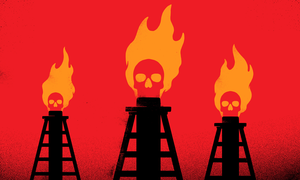
Germany’s BASF – the world’s largest chemical company – wants to look like it is doing the right thing. On the 27th of April, with the brutality of Russia’s invasion of Ukraine then undeniable, the company said it would wind down its non-food businesses in Russia and Belarus by the beginning of July 2022.
Evidently, no-one told BASF subsidiary Wintershall Dea (Wintershall), which profits from being one of Germany’s main suppliers of Russian gas.
One day after BASF’s announcement, Wintershall said it would keep drilling for Russian fossil fuels in partnership with Gazprom – a trade that made the company €400 million between January and March. Since the start of the year, Wintershall has also continued to transport Russian gas into and across Germany. Using German government gas prices, Global Witness estimates this gas to be worth over €14 billion.
- Download a PDF version of this article (227.5 KB), pdf
- Deutsch - BASF profitiert durch die Produktion von russischem Gas (251.3 KB), pdf
A list of evidence used in this brief can be found here and all of the calculations used is here.
At the same time, BASF’s CEO has lobbied hard to
keep the flow of Russian gas into Germany, warning of catastrophe if the supply
is stopped.
It is reported that BASF wants now to sell Wintershall’s Russian operations – potentially profiting from its assets – although according to Bloomberg its chosen buyer would be an investment firm that has been controlled by oligarchs sanctioned for their ties to Russia. BASF has denied it wants to sell to LetterOne, while the investment firm has said it would not buy and its shareholders have no control over the business.
In statements to Global Witness, both BASF and Wintershall defended the decision to maintain Russian operations, citing a need to secure Europe’s gas supply and a responsibility to their workers.
However, if Germany is to cease funding Russia’s invasion of Ukraine, companies like BASF must not only say – but do – the right thing. The company should close Wintershall’s Russian operations and donate its profits to Ukraine. At the same time, the German government should work with the EU to impose a ban on Russian gas imports and rapidly wean the country off the fuel.
BASF wants Germany to keep Russian gas flowing
It is widely reported that Russia’s war machine is fuelled by revenue from Germany’s gas addiction. In March, with the war in Ukraine well underway, 40 percent of Germany’s gas came from Russia. This was a 15 percent drop from 2021 but still amounting to purchases worth €2.8 billion in March alone.
Within Germany, companies use more gas than any other sector. And first amongst these companies is BASF. The corporate giant made €7.8 billion in 2021 producing everything from chemicals to fertilizers, and uses large volumes of gas to, among other things, power its factories.
“We are the industrial user. You see enormous numbers here.” BASF CEO Martin Brudermüller told shareholders in April, emphasizing “the.” “We have about 4% of Germany.”
BASF says it does not buy gas from Russia “directly,” but admits that its suppliers do buy from the country, making it possible that BASF uses Russian gas. But wherever it gets gas from, BASF’s dependency gives it a good reason to keep Russian gas flowing. Accordingly, Brudermüller has lobbied hard to keep the taps open, stating in March that halting supplies “could throw the German economy into its biggest crisis since the end of World War Two.”
BASF profited while Russia expanded gas production
But it is not just BASF’s gas consumption that has caused the company to support continued imports from Russia. The company’s subsidiary Wintershall also profits from the production and transport of Russian gas upon which Germany has become dependent, a trade that provides BASF with dividends.
BASF currently owns nearly three quarters of the German gas and oil producer Wintershall, and the subsidiary is valuable. In 2021, when BASF owned slightly less of Wintershall, its stake was worth €9.6 billion – 11 percent of BASF’s total assets.
Wintershall has been active in Russia for decades, first forming a “long-term cooperation” agreement with state-owned Gazprom in 1990. Since then, it has partnered with the Russian company on projects worldwide, including recent plans to use Russian gas to produce hydrogen – criticized as a false climate solution.
Key to Wintershall’s bottom line, however, have been its Siberian gas fields, which in 2021 produced 15 billion cubic metres (BCM) of gas. (The company also extracted Russian oil, but in much lower volumes.) In 2022, Wintershall’s gas production could be even higher, up 10 percent in the first quarter compared with a year ago.
At the same time, Wintershall has also partnered with Gazprom to transport Russian gas into, and across, Germany. The company owns 15 percent of the Nord Stream 1 pipeline – currently Germany’s only source of Russian gas – with Gazprom owning 51 percent. Wintershall also holds a majority stake in the companies that own Germany’s main internal gas pipelines, taking gas from Nord Stream west and south across the country. The pipes’ other owner was also Gazprom, at least until April when the German government took over.
Since the start of 2022, Wintershall’s pipes have transported over 28 BCM of Russian gas across Germany. Using German government monthly price figures, Global Witness estimates the value of this gas at over €14 billion.
Producing
and transporting Russian gas has been profitable for Wintershall and BASF. In
2021, Wintershall made an adjusted net income of €547 million extracting Russian gas
and oil and €202 million from Nord Stream and its onshore pipes – nearly 80
percent of the company’s total income. As a Wintershall shareholder, BASF
received a received a dividend for 2021 of nearly half a billion euros.
This year has been even better. Between January and March alone, Wintershall made €400 million producing Russian gas and oil, a five-fold increase over the same period in 2021.
Of course, the partnership has benefitted Russia too. The company has helped Russia expand its production, opening fields that could not previously be drilled and sharing key technology with Gazprom. As Wintershall has made money off its Siberian fields and pipes, so has Gazprom. Gas Wintershall produces is also sold to its Russian partner, giving its Kremlin owners control over the fuel. In 2021, Wintershall also paid the Kremlin €148 million in taxes.
This help has likely increased Russia’s leverage over Germany. In 2020, Wintershall stated that gas from its fields was the main supply to the Nord Stream 1 pipeline. At present, Germany gets all of its Russian gas from Nord Stream, leaving the country vulnerable to disruptions of a supply that Wintershall has helped develop but that Russia ultimately controls.
Responding to a Global Witness’ request for comment, BASF stated that Wintershall was continuing its Russian operations because it was contributing to European gas supplies and halting the supply would harm the German economy. The company also said that it had stopped planning any new Russian projects and that “no more capital will be transferred to Russia.”
Also responding, Wintershall condemned the war in Ukraine and said it had stopped new projects and payments into Russia. But the company said it would continue operations because it had a responsibility to its staff and to Europe’s energy supply, and that if it pulled out “billions in assets would fall to the Russian state.”
According to Wintershall, “This is a dilemma a lot of businesses find themselves in. And there is unfortunately no solution to this dilemma.”
Making matters worse
There is evidence that, despite making money off Wintershall, BASF is not happy with its subsidiary. The war in Ukraine initially caused Wintershall to postpone paying its shareholders dividends, although it eventually paid BASF the minimum required legally: €6 million. Wintershall also invested over €1 billion in the Nord Stream 2 pipeline – also owned by Gazprom – which it has now lost after the German government froze the project.
Reportedly, BASF may now even want to sell its stake in Wintershall’s Russian assets to the investment firm LetterOne, which already owns 28 percent of the business. Such a deal would be a fitting coda to BASF’s Russian misadventure.
Of LetterOne’s five publicly-listed owners – Mikhail Fridman, Petr Aven, German Khan, Alexey Kuzmichev, and Andrei Kosogov – all save Kosogov have been sanctioned for their ties to Russia. All five have recently resigned from the firm and Fridman and Aven have had their shares frozen, while Khan and Kuzmichev have transferred their stakes to Kosogov. However, as reported by Bloomberg, it is unclear for how long LetterOne’s Russia-linked owners will relinquish control.
LetterOne itself has not been sanctioned by the US, UK, or EU, and in a statement to Global Witness said that “none of LetterOne’s shareholders have any continuing role or involvement in or with the management, decision-making or business of LetterOne.”
Asked for comment, BASF stated that rumours of a sale to LetterOne “have no basis whatsoever.” For its part, LetterOne said it has no intention of buying Wintershall’s Russian assets and has not discussed a sale with the German company.
However, if reports published by Bloomberg of the proposed sale are true, it does raise the question why BASF thought that a firm part-owned by sanctioned oligarchs was a suitable buyer for their Russian assets upon which Germany’s gas supply currently depends.
Helping Ukraine by ending Germany’s gas addiction
As a company that has helped Russia’s gas industry expand, helped Kremlin-owned Gazprom produce gas, perpetuated Germany’s Russian gas addiction, and profits from its Russian operations, BASF now has a particular responsibility to help the Ukrainian people. As such, BASF should:
- Immediately close down and exit Wintershall’s gas and oil operations in Russia.
- Immediately donate all profits made from the production and transport of Russian gas and oil since the invasion to the Ukrainian victims of Russia’s war.
- Work with the German government to end the importation and transmission of all Russian gas into the country as soon as possible.
At the same time, the German government, which has a responsibly to manage a rapid, just transition away from Russian gas, should:
- Work with other EU member states to impose an immediate ban on the importation of Russian oil still allowed into Europe, and all Russian gas.
- Urge all German companies to immediately stop gas and oil operations in Russia.
- Work with other EU member states to phase out fossil gas and oil from all sources in line with climate targets.
- Ensure that the most vulnerable German consumers are given help to ensure the transition from Russian gas does not increase energy poverty in the country.


